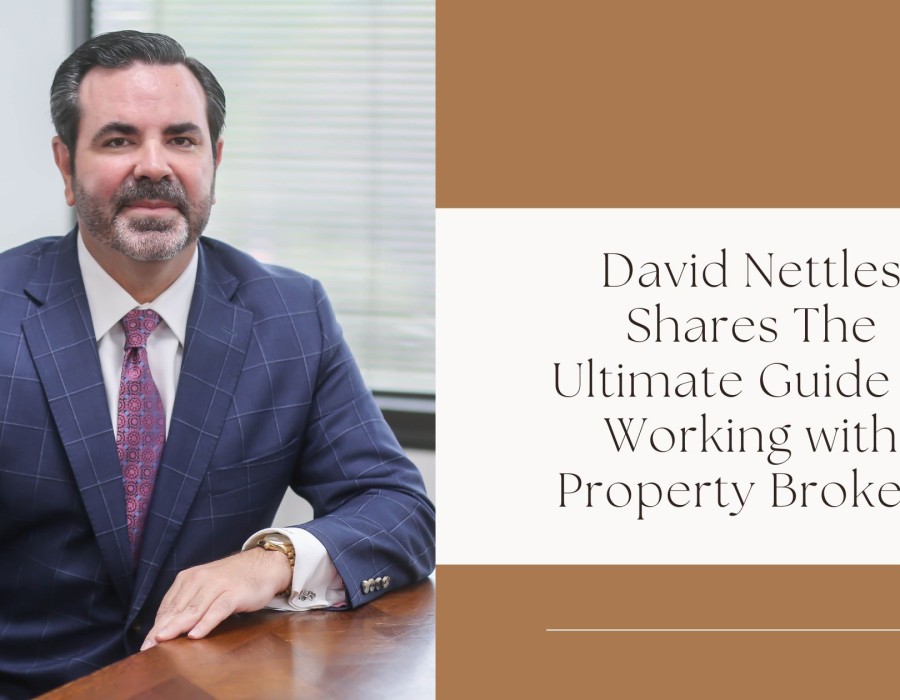Navigating the complex world of real estate can be daunting, especially when buying or selling property. One of the most crucial steps in this process is selecting and working with a property broker. A property broker can be your greatest ally, helping you make informed decisions and ensuring your real estate transaction goes smoothly. In this guide, David Nettles explores the essentials of working with property brokers, providing you with the knowledge and tools to make the most of this important relationship.
1. Understanding the Role of a Property Broker
A property broker is a licensed professional who acts as an intermediary between buyers and sellers in real estate transactions. They possess in-depth market knowledge, legal requirements, and negotiation tactics. Brokers typically oversee the transaction process, ensuring all parties meet their obligations, and that the deal closes successfully. Understanding the broker's role will help you set realistic expectations and leverage their expertise effectively.
2. Why You Need a Property Broker
Whether you're buying or selling a property, the expertise of a property broker can be invaluable. Here’s why:
- Market Knowledge: Brokers have access to comprehensive market data, enabling them to provide insights into property values, market trends, and investment potential.
- Negotiation Skills: An experienced broker can negotiate favorable terms on your behalf, helping you get the best possible deal.
- Time and Convenience: Brokers manage the time-consuming tasks associated with real estate transactions, such as property showings, paperwork, and communication with all parties involved.
- Legal Compliance: Brokers ensure that all legal requirements are met, reducing the risk of potential issues during or after the transaction.
3. How to Choose the Right Property Broker
Choosing the right broker is critical to your success in real estate. Here are some tips for selecting the best one:
- Experience: Look for a broker with a proven track record in the type of property you’re interested in, whether residential, commercial, or investment properties.
- Reputation: Check reviews, testimonials, and references to gauge the broker's reputation in the industry.
- Local Knowledge: A broker who specializes in the area where you’re buying or selling will have a deeper understanding of the local market dynamics.
- Communication: Choose a broker who is responsive, transparent, and easy to communicate with. Effective communication is key to a successful transaction.
- Credentials: Ensure the broker is licensed and affiliated with reputable real estate organizations. Additional certifications in specialties like luxury homes or commercial properties can also be a plus.
4. Setting Clear Expectations
Once you've selected a broker, it's important to establish clear expectations from the outset. Discuss the following with your broker:
- Scope of Services: Clarify what services the broker will provide, including property marketing, buyer or seller representation, and post-sale support.
- Fees and Commission: Discuss the broker's fees and how they will be structured. Most brokers work on a commission basis, typically a percentage of the property’s sale price.
- Timeline: Set a realistic timeline for the transaction, considering factors like market conditions and property readiness.
- Communication Preferences: Agree on how often you will communicate and through which channels (e.g., phone, email, in-person meetings).
5. Building a Collaborative Relationship
A successful real estate transaction is a collaborative effort between you and your broker. Here's how to foster a productive relationship:
- Be Transparent: Share your goals, budget, and any concerns you have with your broker. The more information they have, the better they can assist you.
- Trust Their Expertise: Rely on your broker’s knowledge and experience, especially during negotiations and decision-making processes.
- Stay Engaged: Keep the lines of communication open and stay involved throughout the transaction. Regular updates will help you stay informed and make timely decisions.
- Provide Feedback: Constructive feedback can help your broker tailor their services to better meet your needs.
6. Common Pitfalls to Avoid
Working with a property broker can greatly simplify the real estate process, but there are common pitfalls to watch out for:
- Choosing Based on Commission Alone: While it’s important to consider costs, the broker’s experience, reputation, and service quality should be your top priorities.
- Not Asking Enough Questions: Don’t hesitate to ask your broker about anything you don’t understand. Clarity is key to avoiding misunderstandings.
- Ignoring Market Realities: Listen to your broker’s advice about market conditions, even if it’s not what you want to hear. Unrealistic expectations can lead to disappointment.
- Failing to Read the Fine Print: Carefully review all contracts and agreements before signing. Your broker should be willing to explain any terms you don’t understand.
7. Conclusion
Working with a property broker can be a game-changer in your real estate journey. By selecting the right broker, setting clear expectations, and maintaining a collaborative relationship, you can navigate the complexities of the market with confidence. Remember, your broker is there to support you, so take full advantage of their expertise and resources. With the right approach, your property transaction can be a smooth and successful experience.





Comments